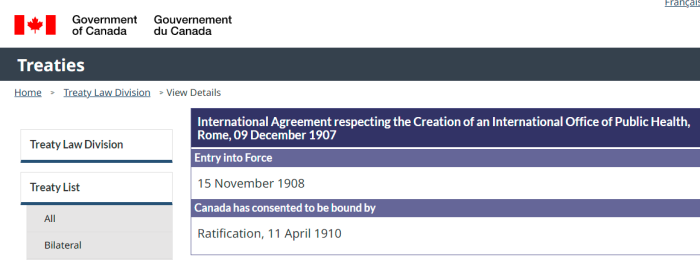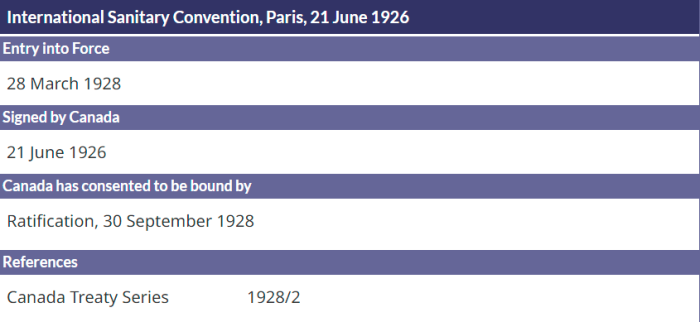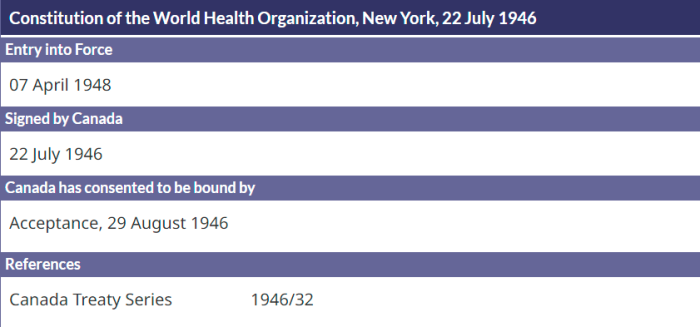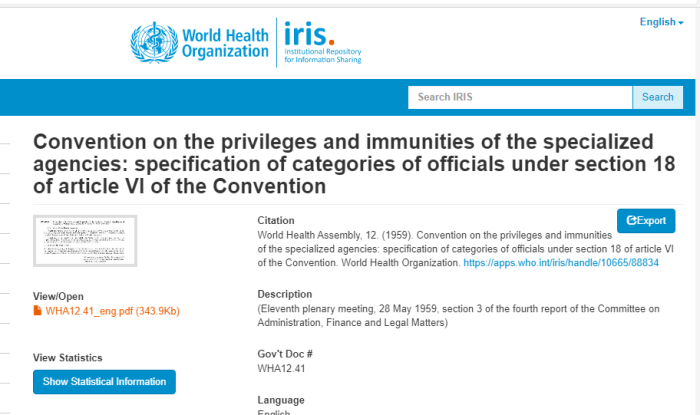“Conservative Inc.” politicians and media heads have been spouting off recently about the proposed “Global Pandemic Treaty” that the World Health Organization is considering. While it appears they’re addressing an important topic, the public is never given the complete story.
An enormous disservice to the public is done since they never mention the similar agreements that are already in place. Countries signed away their sovereignty generations ago. Either these people know nothing about that, or they pretend not to know.
This helps to illustrate why there doesn’t appear to be any realistic political solution available. Even the “opposition” voices act as gatekeepers. Whether it’s intentional, or through ignorance, the result is the same: the public not getting vital information. This applies both to media and politics.
All of this data is freely available, and can be found in seconds.






There are other, interrelated Treaties Canada is a part of. It’s best to just search the entire listings. The relevant ones are posted under Health, or as Health & Sanitation.
Over a century ago, an International Public Health Office was created, which we became a part of. This was done without any democratic mandate of course.
1926: International Sanitary Convention was ratified in Paris.
1946: WHO’s Constitution was signed, and it’s something we’ll get into in more detail.
1951: International Sanitary Regulations adopted by Member States.
1969: International Health Regulations (1st Edition) replaced ISR. These are legally binding on all Member States.
2005: International Health Regulations 3rd Edition of IHR were ratified.
Other issues Con Inc. won’t bring up:
- Health Canada was initially created for population control measures.
- Public Health Agency of Canada, PHAC, is a branch of WHO.
- 2005 Quarantine Act is domestic implementation of WHO-IHR, 3rd Ed.
The problem is more than just Federal. Various Provincial “Health Acts” contain sections of WHO-IHR written right into them. See Part 1 and Part 2. Of course, Municipalities are required to follow Provincial orders. The result is that at all levels, people’s rights are suspended under public health agreements that weren’t written in this country.
All said: none of this is shared by more “mainstream” sources. It begs the obvious question: do people not know the full truth, or are they deliberately trying to conceal the full extent of the problem?

If that wasn’t bad enough, the World Health Organization has given immunity to all employees and agents who work on their behalf, anywhere in the world. Nothing says accountability quite like the power to act without consequences.
As for the Constitution of the World Health Organization, let’s take a look at what’s in there. Anyone serious about national sovereignty needs to abandon the WHO completely.
Article 4
Members of the United Nations may become Members of the Organization by signing or otherwise accepting this Constitution in accordance with the provisions of Chapter XIX and in accordance with their constitutional processes.
Sounds pretty straightforward. If you want to be a Member of the World Health Organization, you need to accept or adopt their constitution.
Article 7
If a Member fails to meet its financial obligations to the Organization or in other exceptional circumstances, the Health Assembly may, on such conditions as it thinks proper, suspend the voting privileges and services to which a Member is entitled. The Health Assembly shall have the authority to restore such voting privileges and services.
So, being part of this group is voluntary. However, if you don’t pay your bills, WHO can suspend your voting rights. They can also be removed under the undefined “exceptional circumstances”. Sounds a bit undemocratic, doesn’t it?
Article 19
The Health Assembly shall have authority to adopt conventions or agreements with respect to any matter within the competence of the Organization. A two-thirds vote of the Health Assembly shall be required for the adoption of such conventions or agreements, which shall come into force for each Member when accepted by it in accordance with its constitutional processes.
Article 20
Each Member undertakes that it will, within eighteen months after the adoption by the Health Assembly of a convention or agreement, take action relative to the acceptance of such convention or agreement. Each Member shall notify the Director-General of the action taken, and if it does not accept such convention or agreement within the time limit, it will furnish a statement of the reasons for non-acceptance. In case of acceptance, each Member agrees to make an annual report to the Director-General in accordance with Chapter XIV
The Health Assembly has the right to determine its own conventions and agreement, and it can be done with a 2/3 vote. By this rationale, Canada could easily be forced into adopting policies that it fundamentally disagrees with. And to state the obvious, there was never any domestic vote or referendum over this.
Members are also obligated to go along with any convention or agreement. If they refuse, written reasons have to be provided.
Article 21
The Health Assembly shall have authority to adopt regulations concerning:
(a) sanitary and quarantine requirements and other procedures designed to prevent the international spread of disease;
(b) nomenclatures with respect to diseases, causes of death and public health practices;
(c) standards with respect to diagnostic procedures for international use;
(d) standards with respect to the safety, purity and potency of biological, pharmaceutical and similar products moving in international commerce;
(e) advertising and labelling of biological, pharmaceutical and similar products moving in international commerce.
Article 22
Regulations adopted pursuant to Article 21 shall come into force for all Members after due notice has been given of their adoption by the Health Assembly except for such Members as may notify the Director-General of rejection or reservations within the period stated in the notice.
The World Health Organization has the power to adopt regulations regarding quarantine and international spread of diseases. It will also have the authority regarding naming them, case definitions, and putting pharma products on the market. Ever wonder why there’s no discussion locally? It’s because the major decisions are all being made by outside institutions.
Article 62
Each Member shall report annually on the action taken with respect to recommendations made to it by the Organization and with respect to conventions, agreements and regulations.
Article 63
Each Member shall communicate promptly to the Organization important laws, regulations, official reports and statistics pertaining to health which have been published in the State concerned.
Article 64
Each Member shall provide statistical and epidemiological reports in a manner to be determined by the Health Assembly
Again, this is supposedly “voluntary”, but countries are required to report their actions, including what laws and policies they’ve enacted to enforce WHO dictates.
CHAPTER XV – LEGAL CAPACITY, PRIVILEGES AND IMMUNITIES
Article 66
The Organization shall enjoy in the territory of each Member such legal capacity as may be necessary for the fulfilment of its objective and for the exercise of its functions.
Article 67
(a) The Organization shall enjoy in the territory of each Member such privileges and immunities as may be necessary for the fulfilment of its objective and for the exercise of its functions.
(b) Representatives of Members, persons designated to serve on the Board and technical and administrative personnel of the Organization shall similarly enjoy such privileges and immunities as are necessary for the independent exercise of their functions in connexion with the Organization.
Article 68
Such legal capacity, privileges and immunities shall be defined in a separate agreement to be prepared by the Organization in consultation with the Secretary-General of the United Nations and concluded between the Member
How are we an independent state, when WHO officials have the right to operate on our territory, and are awarded immunity (presumably legal) from the consequences of their actions?
Instead of pandering over the proposed Global Pandemic Treaty, people like Leslyn Lewis should be talking about getting out of the World Health Organization altogether.
Sure, the call to fire Theresa Tam is catchy, but it misses the big picture.
(1) https://www.treaty-accord.gc.ca/index.aspx
(2) https://www.treaty-accord.gc.ca/details.aspx?lang=eng&id=103984&t=637793587893732877
(3) https://www.treaty-accord.gc.ca/details.aspx?lang=eng&id=103986&t=637862410289812632
(4) https://www.treaty-accord.gc.ca/details.aspx?lang=eng&id=103990&t=637793587893576566
(5) https://www.treaty-accord.gc.ca/details.aspx?lang=eng&id=103994&t=637862410289656362
(6) https://www.treaty-accord.gc.ca/details.aspx?lang=eng&id=103997&t=637793622744842730
(7) https://www.treaty-accord.gc.ca/details.aspx?lang=eng&id=105025&t=637793622744842730
(8) https://apps.who.int/iris/handle/10665/88834
(9) https://canucklaw.ca/wp-content/uploads/2020/09/ihr.convention.on_.immunities.privileges.pdf
(10) https://cdn.who.int/media/docs/default-source/documents/publications/basic-documents-constitution-of-who179f0d3d-a613-4760-8801-811dfce250af.pdf?sfvrsn=e8fb384f_1&download=true
(11) WHO Constitution Full Document

Excellent research and dot-connection. You have done many a great service.
What you have also pointed out indirectly, is that the ‘party’ leaders are either horribly incompetent and ignorant, or they are playing a role…I think the latter. They are told to hammer on a particular ‘fall guy’, presently Trudeau and Tam, to ensure cover is provided for all the other traitors working for the World Government and pretending they are working for Canadians.
Excellent research Ronnie! I love your work.
Another eye opener thanks.